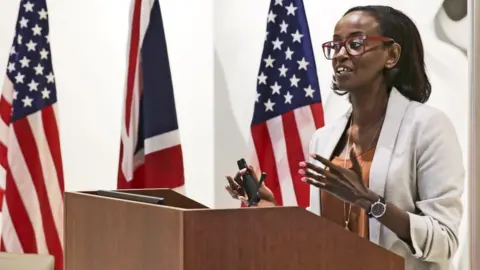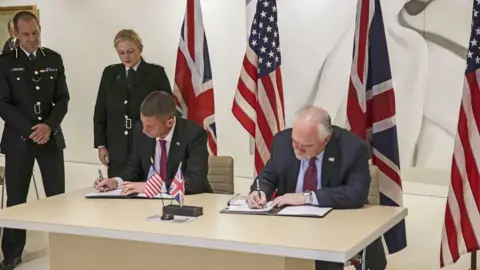UK schoolgirls pressured into FGM, campaigner says
 US Embassy/PA
US Embassy/PABritish schoolgirls have been pressured by their fellow students into having female genital mutilation, a campaigner against the practice has said.
Leyla Hussein said girls are vulnerable as some see it as a cultural practice despite it being a crime in the UK.
Her warning came as British and US agencies signed an agreement to step up co-operation in tackling FGM.
A police commander said intelligence has to date been "woeful" and the lack of a UK conviction was unacceptable.
Commander Ivan Balhatchet from the National Police Chiefs' Council is appealing to the public, support groups and those who work with children to pass information to police.
The proclamation between law enforcement agencies on both sides of the Atlantic - including the NPCC, the Metropolitan Police, Border Force, the FBI, and the US Department of Homeland Security - pledges to better share intelligence and best practice on identifying victims and prosecuting perpetrators.
 US Embassy, PA
US Embassy, PAIt is hoped the new agreement will improve existing operations at airports including London Heathrow and JFK in New York and help spot victims as they are taken to parts of the world to be cut, such as North Africa and the Middle East.
'The pressure is still there'
Dr Hussein, a psychotherapist who had FGM in Somalia when she was aged seven, is backing the UK and US efforts.
She said: "The pressure is still there... some of my clients are 19-year-old girls now who were children or were born in this [country] and they will say to you they were pressured in a playground in a school in London to go and have it done."
Dr Hussein, who moved to the UK aged 12 but said she did not know FGM was wrong until years later, said "education plays a big part, in terms of prevention, because I said if I had some information in my school I might have said something".
She founded the north London-based Dahlia Project to raise awareness and support FGM victims.

Female genital mutilation
- Includes "the partial or total removal of the female external genitalia or other injury to the female genital organs for non-medical reasons"
- Practised in 30 countries in Africa and some countries in Asia and the Middle East
- An estimated three million girls and women worldwide are at risk each year
- About 125 million victims estimated to be living with the consequences
- It is commonly carried out on young girls, often between infancy and the age of 15
- Often motivated by beliefs about what is considered proper sexual behaviour, to prepare a girl or woman for adulthood and marriage and to ensure "pure femininity"
- Dangers include severe bleeding, problems urinating, infections, infertility and increased risk of childbirth complications and newborn deaths
Source: World Health Organization

NHS figures in England recorded between April 2015 and March 2018 show more than 16,000 women and girls have undergone FGM at some point in their lives.
The 6,195 cases recorded between April 2017 and March this year involved 150 people who were born in the UK and 1,715 born in eastern Africa.
FGM has been illegal in the UK since 1985 and further legislation in 2003 and 2005 made it an offence to arrange FGM outside the country for British citizens or permanent residents. But there is yet to be a successful prosecution.
The government has put increasing efforts into tackling FGM in recent years and it is compulsory for family doctors, hospitals and mental health trusts to report any new cases in their patients.
